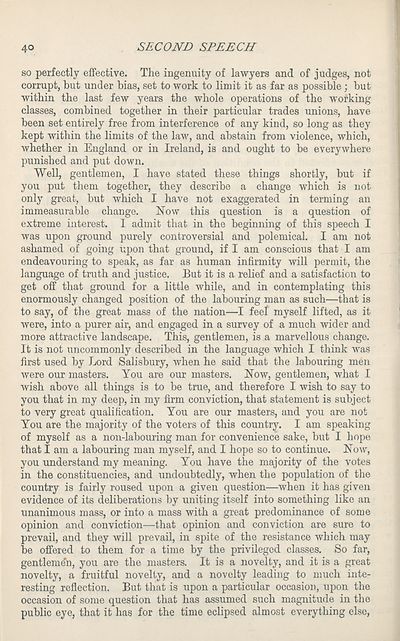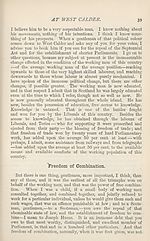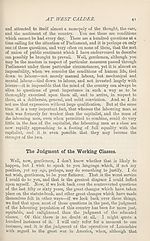Download files
Complete book:
Individual page:
Thumbnail gallery: Grid view | List view

4°
SECOND SPEECH
so perfectly effective. The ingenuity of lawyers and of judges, not
corrupt, but under bias, set to work to limit it as far as possible; but
within the last few years the whole operations of the working
classes, combined together in their particular trades unions, have
been set entirely free from interference of any kind, so long as they
kept within the limits of the law, and abstain from violence, which,
whether in England or in Ireland, is and ought to be everywhere
punished and put down.
Well, gentlemen, I have stated these things shortly, but if
you put them together, they describe a change which is not
only great, but which I have not exaggerated in terming an
immeasurable change. Now this question is a question of
extreme interest. I admit that in the beginning of this speech I
was upon ground purely controversial and polemical. I am not
ashamed of going upon that ground, if I am conscious that I am
endeavouring to speak, as far as human infirmity will permit, the
language of truth and justice. But it is a relief and a satisfaction to
get off that ground for a little while, and in contemplating this
enormously changed position of the labouring man as such—that is
to say, of the great mass of the nation—I feel myself lifted, as it
were, into a purer air, and engaged in a survey of a much wider and
more attractive landscape. This, gentlemen, is a marvellous change.
It is not uncommonly described in the language which I think was
first used by Lord Salisbury, when he said that the labouring men
were our masters. You are our masters. Now, gentlemen, what I
wish above all things is to be true, and therefore I wish to say to
you that in my deep, in my firm conviction, that statement is subject
to very great qualification. You are our masters, and you are not
You are the majority of the voters of this country. I am speaking
of myself as a non-labouring man for convenience sake, but I hope
that I am a labouring man myself, and I hope so to continue. Now,
you understand my meaning. You have the majority of the votes
in the constituencies, and undoubtedly, when the population of the
country is fairly roused upon a given question—when it has given
evidence of its deliberations by uniting itself into something like an
unanimous mass, or into a mass with a great predominance of some
opinion and conviction—that opinion and conviction are sure to
prevail, and they will prevail, in spite of the resistance which may
be offered to them for a time by the privileged classes. So far,
gentleme'n, you are the masters. It is a novelty, and it is a great
novelty, a fruitful novelty, and a novelty leading to much inte¬
resting reflection. But that is upon a particular occasion, upon the
occasion of some question that has assumed such magnitude in the
public eye, that it has for the time eclipsed almost everything else,
SECOND SPEECH
so perfectly effective. The ingenuity of lawyers and of judges, not
corrupt, but under bias, set to work to limit it as far as possible; but
within the last few years the whole operations of the working
classes, combined together in their particular trades unions, have
been set entirely free from interference of any kind, so long as they
kept within the limits of the law, and abstain from violence, which,
whether in England or in Ireland, is and ought to be everywhere
punished and put down.
Well, gentlemen, I have stated these things shortly, but if
you put them together, they describe a change which is not
only great, but which I have not exaggerated in terming an
immeasurable change. Now this question is a question of
extreme interest. I admit that in the beginning of this speech I
was upon ground purely controversial and polemical. I am not
ashamed of going upon that ground, if I am conscious that I am
endeavouring to speak, as far as human infirmity will permit, the
language of truth and justice. But it is a relief and a satisfaction to
get off that ground for a little while, and in contemplating this
enormously changed position of the labouring man as such—that is
to say, of the great mass of the nation—I feel myself lifted, as it
were, into a purer air, and engaged in a survey of a much wider and
more attractive landscape. This, gentlemen, is a marvellous change.
It is not uncommonly described in the language which I think was
first used by Lord Salisbury, when he said that the labouring men
were our masters. You are our masters. Now, gentlemen, what I
wish above all things is to be true, and therefore I wish to say to
you that in my deep, in my firm conviction, that statement is subject
to very great qualification. You are our masters, and you are not
You are the majority of the voters of this country. I am speaking
of myself as a non-labouring man for convenience sake, but I hope
that I am a labouring man myself, and I hope so to continue. Now,
you understand my meaning. You have the majority of the votes
in the constituencies, and undoubtedly, when the population of the
country is fairly roused upon a given question—when it has given
evidence of its deliberations by uniting itself into something like an
unanimous mass, or into a mass with a great predominance of some
opinion and conviction—that opinion and conviction are sure to
prevail, and they will prevail, in spite of the resistance which may
be offered to them for a time by the privileged classes. So far,
gentleme'n, you are the masters. It is a novelty, and it is a great
novelty, a fruitful novelty, and a novelty leading to much inte¬
resting reflection. But that is upon a particular occasion, upon the
occasion of some question that has assumed such magnitude in the
public eye, that it has for the time eclipsed almost everything else,
Set display mode to:
![]() Universal Viewer |
Universal Viewer | ![]() Mirador |
Large image | Transcription
Mirador |
Large image | Transcription
| Antiquarian books of Scotland > Politics & government > Political speeches in Scotland in 1890 > (44) |
|---|
| Permanent URL | https://digital.nls.uk/126568818 |
|---|
| Description | Thousands of printed books from the Antiquarian Books of Scotland collection which dates from 1641 to the 1980s. The collection consists of 14,800 books which were published in Scotland or have a Scottish connection, e.g. through the author, printer or owner. Subjects covered include sport, education, diseases, adventure, occupations, Jacobites, politics and religion. Among the 29 languages represented are English, Gaelic, Italian, French, Russian and Swedish. |
|---|

